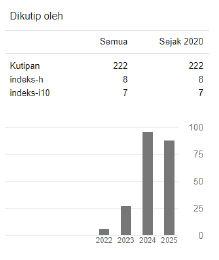The Role of Interactive Learning Media in Improving Students' Learning Motivation of Islamic Education
 https://doi.org/10.54012/ijcer.v3i3.470
https://doi.org/10.54012/ijcer.v3i3.470
 Abstract views: 311
Abstract views: 311
 PDF downloads: 194
PDF downloads: 194
Keywords:
Interactive Learning Media, Learning Motivation, Islamic EducationAbstract
This study aims to explore the role of interactive learning media in enhancing students’ motivation to learn in Islamic Religious Education (PAI) subjects. In today’s digital era, the use of interactive media has become an essential innovation in the field of education. These media provide a more engaging and enjoyable learning experience, actively involving students in the learning process. The research method used is qualitative descriptive with data collected through observation, interviews, and documentation. The results show that interactive learning media, such as educational videos, interactive quizzes, and digital applications, are effective in increasing students' interest and participation in PAI lessons. Students became more enthusiastic, actively asked questions, and demonstrated improved understanding of the subject matter. In addition, teachers felt supported in delivering materials more effectively and efficiently. The conclusion of this study is that interactive learning media play a significant role in improving students' learning motivation, especially in PAI subjects, which are often perceived as monotonous by some students. Therefore, the development and utilization of interactive media should continue to be enhanced to create more meaningful and enjoyable learning experiences.
Downloads
References
S. Anwar, S. Ali, A. Labib, dan Y. Rahmawati, “Hafalan Al- Qur ’ an Dirumah Tahfizh Al -Furqon Pringsewu : Penerapan Metode Muri-Q Memory of the Qur ’ an At Tahfizh Boarding Al-Furqon Pringsewu ’ S : Application of the Muri-Q Method,” vol. 01, no. 01, hal. 8–14, 2021.
A. Labib dan I. Syafe, “Implementation of Religious Values for the Character of Students of MAN 1 Bandar Lampung,” vol. 4, no. 001, hal. 290–300, 2024.
Y. Rahmawati, K. Candra Pradana, A. Rinaldi, M. Syazali, dan A. History, “Curiosity and creative characters: The impact on students’ numerical ability,” Desimal J. Mat., vol. 4, no. 2, hal. 231–246, 2021, doi: 10.24042/djm.
Miftahul Huda dan Irwansyah Suwahyu, “Peran Artificial Intelligence (Ai) Dalam Pembelajaran Pendidikan Agama Islam,” Ref. Islam. J. Stud. Islam, vol. 2, no. 2, hal. 53–61, 2024, doi: 10.61220/ri.v2i2.005.
M. Syazali, U. Iqoh, V. F. Mufty, dan Y. Rahmawati, “Auditory intellectually repetition learning model and trade a problem learning model on row and series algebraic material: The influences on numerical skills,” in IOP Conference Series: Earth and Environmental Science, IOP Publishing Ltd, Mar 2021. doi: 10.1088/1742-6596/1796/1/012104.
I. Lenaini, “Teknik Pengambilan Sampel Purposive Dan Snowball Sampling,” Hist. J. Kajian, Penelit. Pengemb. Pendidik. Sej., vol. 6, no. 1, hal. 33–39, 2021, [Daring]. Tersedia pada: http://journal.ummat.ac.id/index.php/historis
Downloads
Published
How to Cite
Issue
Section
License
Copyright (c) 2025 Trajaya, Tomy Wijaya, Amnur M. Ariya Nugroho, Win Dityo Jaya Pratama, Evi Febriani

This work is licensed under a Creative Commons Attribution-ShareAlike 4.0 International License.









